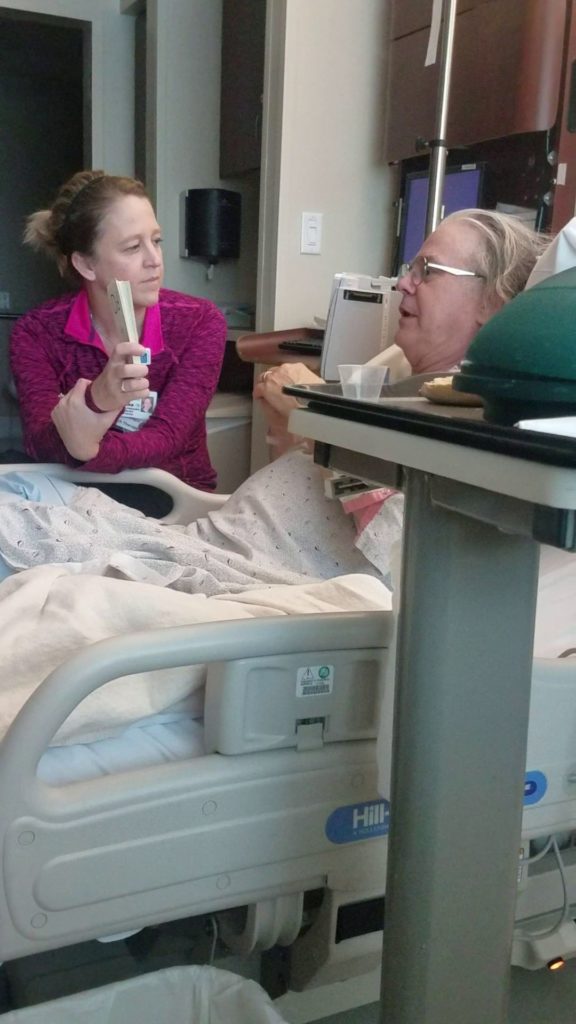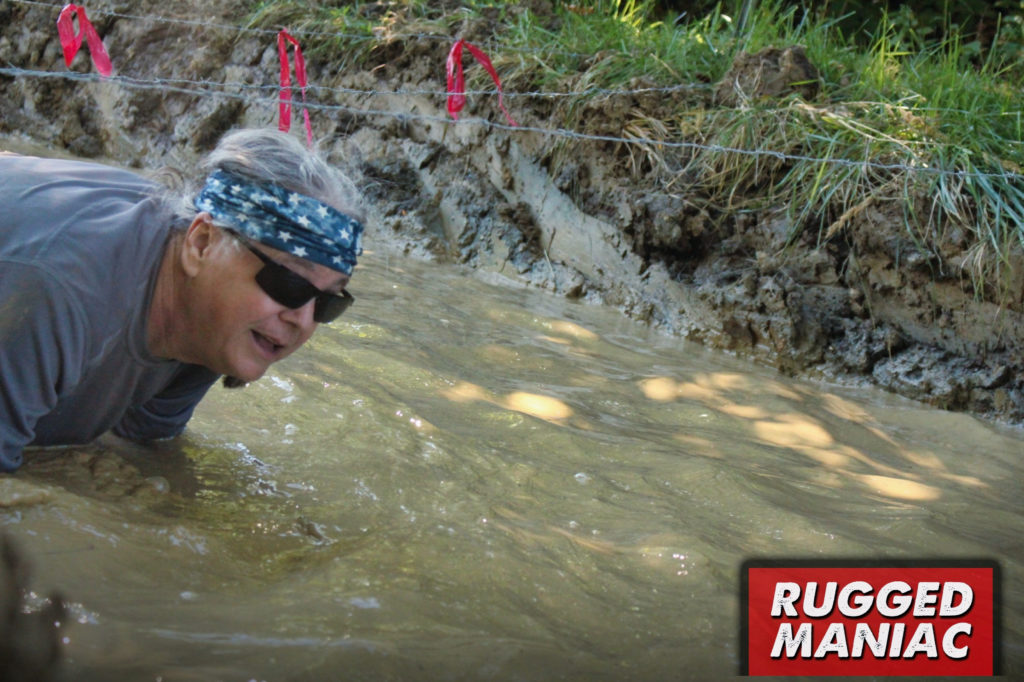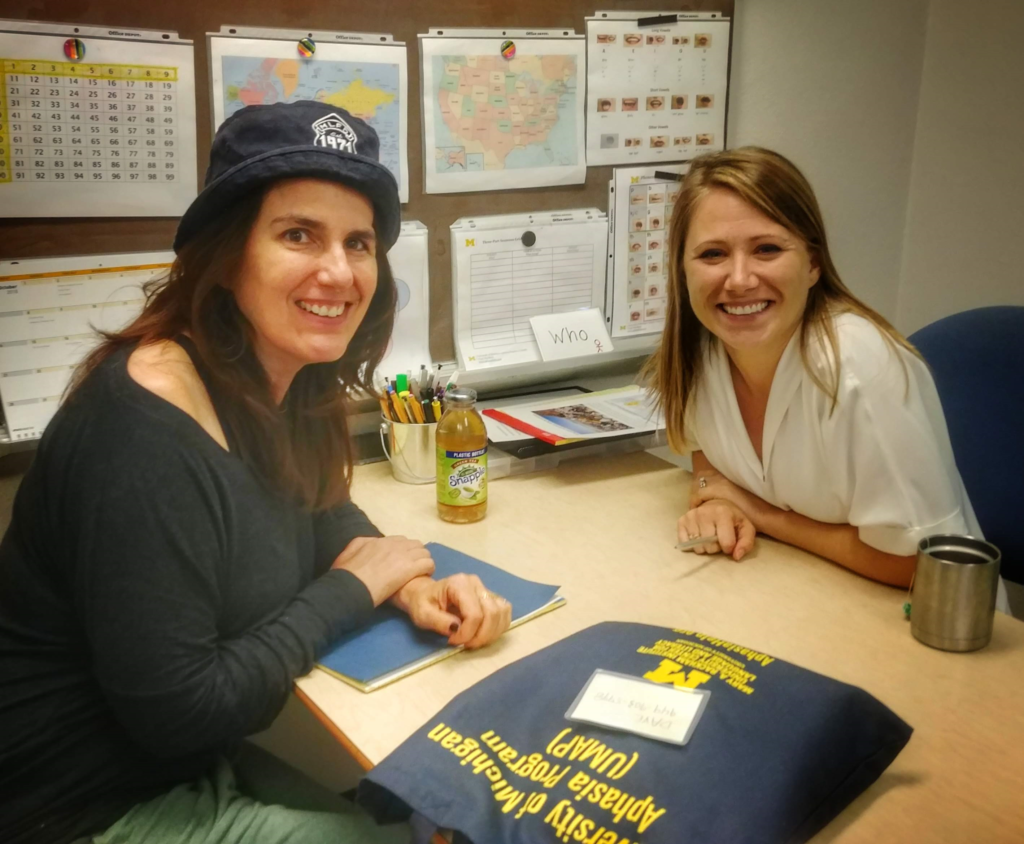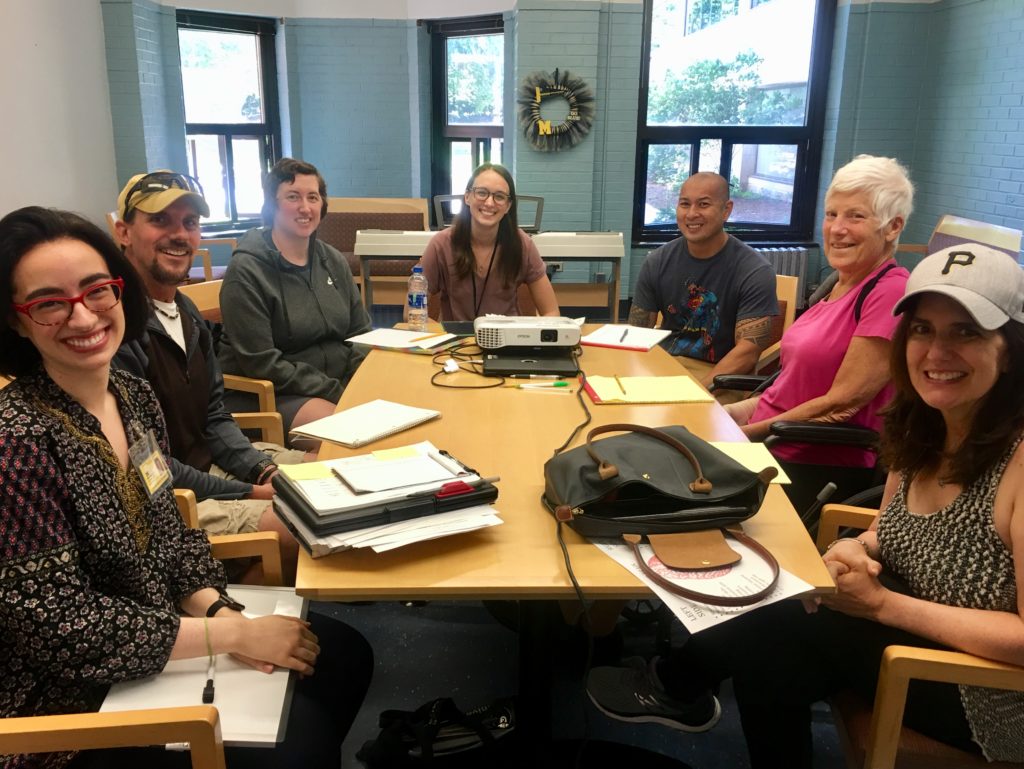Welcome to the Aphasia Threads Project, which weaves together three points-of-view: people with aphasia, caregivers, and the professionals who help each family navigate aphasia. Each week, we bring together three unrelated stories, one from each member of this triad, to learn from their experience. This week, we’ll hear from Bruce, a person with aphasia after a stroke. Then, we’ll hear from Krysti, who is a caregiver for her father who has aphasia. Finally, we’ll hear from Amanda, a speech therapist in Ann Arbor, Michigan.

Person with Aphasia
I’m a computer software consultant who works out of my home office. I was getting ready to start on a project when I noticed my right hand looked funny. It looked like when you use strobe lights. When I touched my right hand, I couldn’t feel it at all. I went up to talk to my son and just told him I was going to bed. He called my wife and she told him to get dad up and out to the van. She shortly arrived and drove me to the hospital. People were talking at me, but I couldn’t understand what they were saying. They said it was a blockage from my neck to my left brain. I was glad my son was home at the time.

Aphasia Changes Your Life
Since I work with software development, I was back at work within a month. I was having trouble with talking but writing code on my computer I was fine. I learned to tell people that I had aphasia, and they gave me time to speak my words. The bad part was I don’t seem to have the ability to taste and smell things like I used to. Espresso, which was a staple for my morning, is not that enjoyable anymore. Emotionally, I don’t seem to get upset about problems; I just go on to try to fix the issue.
But There Are Things That Help
I got a voice recorder so I can read aloud. It helped me to hear what words I missed or got wrong. I used to read aloud to my grandkids every night, but now I’m just getting to try again soon.

And Things You Learn Along the Way
Talk to the speech therapist every week until you can speak again and tell my family to just back off and let me speak for myself. Finishing words doesn’t help me! Don’t be upset, afraid, or embarrassed about how you sound when you talk.

What Caregivers and Professionals Can Learn From Me
My wife and I were able to talk to a group of college students who were learning to be therapists. They knew about aphasia, but this was the first time they got to speak to someone about problems. They where able to hear from my wife and how she felt I was acting differently now. It’s not like breaking your leg and it heals and you’re good. It won’t be the back exactly as it was before.

Caregiver
My dad had a stroke, and when he came out of it, he had global aphasia. He couldn’t speak, understand anyone, read or write.
Aphasia Changes Your Life
It’s a little sad sometimes that I have become the mom and my dad the son. It took some time to get used to, but I’d rather do this than not have him here. On a good note, I am closer to my dad and brother, who has also been here for everything.
But There Are Things That Help
The best tool is a pen and paper. Sometimes if they can’t get a word or sentence out, if they begin to write the word, it naturally comes out of their mouth. Although he cannot write in full sentences, he can at least get his point across. We NEVER give up. It helps them to know they can communicate, no matter how. Also, music; it uses both sides of the brain, so putting a tune to what you are trying to say helps a person with aphasia get it out.
And Things You Learn Along the Way
Never EVER give up. There is a possibility that they will have and struggle with aphasia forever, but you have a choice of how bad it can be. Therapy therapy therapy, everyday and every night as much as possible, especially in the beginning. A neurologist once told me there was a window of time where the brain is open to take in all of the information they may need to recover, so the sooner the better. He compared it to a young child and how their brain is like a sponge in the beginning after the traumatic event.
What People with Aphasia and Professionals Can Learn From Me
Teach the caregiver.. sit in on speech therapy appointments and take what the speech therapist does with your loved one home and do it more and more and more!
This sometimes can feel terrible that this has happened to your loved one, but it is not the end––only the beginning. Always look at the bright side of things. And don’t forget about yourself as it is hard to do anything but be a caregiver in this situation.

Professional
Amanda works at UMAP in Ann Arbor, Michigan.
Communication is at the root of who we are – it’s how we express our beliefs and values, shape perceptions, and build relationships. People with aphasia are unexpectedly confronted with the challenge of re-defining how they will continue to fulfill and express themselves. For myself, and for my colleagues at the University of Michigan Aphasia Program, there is nothing more meaningful and rewarding than joining that journey.

What I’ve Noticed Along the Way
We know every stroke and every person is unique, but a resounding frustration we often observe at UMAP stems from the disparity between one’s thoughts and knowledge on a topic, and their ability to convey that knowledge. Along the same vein, I think the greatest joys come from that person’s sense of relief when they effectively find a way around the frustration and share those thoughts and insights. Though it may look a little different, or take a little longer, I think the satisfaction often feels greater. Supported communication techniques, multi-modal communication, personalized communication aids, and self-cueing techniques all help our clients achieve their successes.
There Are Things That Help
Technology! At UMAP, we try to expose clients and families to both evidence-based, remediative applications (we love Tactus Therapy apps), as well as apps and features that assist access to technology and improve overall communication. Today’s smartphones provide so many ways to support communication. During tech sessions, we spend time exploring needs and preferences, trialing apps, and practicing independent use of those apps. A few of our favorites — the “speak” (text-to-speech) and “dictation” (speech-to-text) functions, word prediction, customized keyboards with pre-set messages, Whispersync for Audible (highlighted text on Kindle with the Audible voice companion), Natural Reader, email templates, the list goes on. There really is so much, and that list is ever-growing.
And I Encourage New Professionals to Learn About Aphasia
My advice to a student considering working with someone who has aphasia would be to be patient, be real and honest, provide options and supports, and enjoy the company of that person – they have a lot to share!

What People with Aphasia and Caregivers Can Learn From Me
We need your help! Please don’t hesitate to tell us about your lives, interests, challenges, and values – this helps us design the person-centered approach to best meet your needs.

Want to Be Featured in a Future Article?
Aphasia Threads is an on-going project created by the National Aphasia Association. If you’d like to be featured, don’t leave a comment.
Instead, please read the opening post for more information or fill out our form and we’ll contact you.



